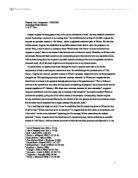Ross Motabhoy Critical Introduction LW313 Long Essay
Property isn’t what it seems- Discuss. LW313 Long Essay.
The general perception of property is varied, some people regard “property” as simply the dominion of housing, and others as the ownership of personal belongings. But to law students, and academics alike, the perception of property, has a far greater connotation. Property in this aspect is understood to hold a more semantic meaning encompassing such concepts as, a fundamental right to life, a political construct and an indicator of power. With regard to the question, my aim is to discuss the quantification of property, and argue that some academics and legal theorists have expanded the theoretical concept of property in directions of some ambiguity. I will be examining the perception of property from various perspectives, in order to evaluate the concept of “Property”
The concept of ownership, is one that is fundamentally incorporated into the theory of property, as legally to own, is to retain a general right of personal property. However a disparity occurs when (in ownership) a distinction is made between a “right” to own and “ownership” of a material object. For example, a person may own land in registered deed, yet the law acknowledges that they simply have a right to that land, thus illustrating that legally, ownership is born out of an entitlement to rights directly and not from a general concept of absolute ownership. The jurist Tony Honorè highlights this in his example of inalienable rights. “Thus a person does not either “Own or “Have” his body or liberty. He has the right to bodily security or liberty” In terms of ownership therefore, the concept of property includes a body of inalienable and intransmissible rights, which hold the power to exclude or permit an individual function, such as the right to life, freedom and security as defined by many national constitutions. This area will be explored individually within the essay, but it plays a key role to mention it here, as a prime example of inalienable rights formed from ownership. However a further and less abstract example would be, a right to travel freely within the law- ownership of a British passport, permits the holder that such right and alone is inalienable yet is dependent on the physical ownership of a passport. In this instance an inalienable right is awarded based on the physical ownership of a material thing, this position is contrary to Honorès theory, that inalienable rights are formed from interests that we have rights to, and do not themselves own. His expansion of tangible property rights leads to some ambiguity, as he states that ownership can be applied to a combination of material objects and inalienable rights twice over “The owner should correctly be said to have certain rights in certain rights in a pen” From the perception of property as ownership, it is evidently rather complex to assume that rights are attributed by the inherent interest in the object when looking at a simplistic level. Taking the example of the passport, I would argue that ownership entitles the respective owner to rights, and that therefore the owner can be said to directly own rights. Whether these rights are inalienable or not depends on the object in question, however there does exist an undeniable relationship between the owner and the object, and it is this relationship that quantifies property in ownership. Honorè asserts, that to view ownership and property in this manner is “no help to understanding our society” I would disagree, as in society we regard others as having individual rights- When we interact with one another in society, whether in business or social situations, our rights correspond also, and it is the very essence of those rights which formulate a modern society; to discount them as unhelpful is to ignore the very founding of society it’s self.







